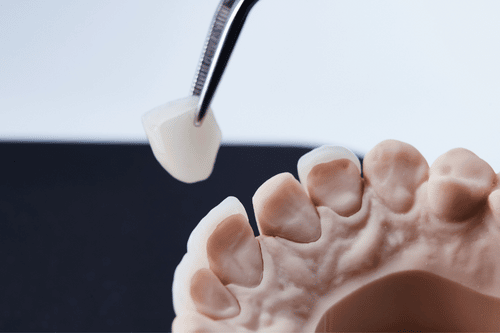
Veneers are a popular dental treatment, and for a good reason. Dental veneers can replace damaged or stained enamel and improve the appearance of your teeth. Your dentist can also use them to fix chips or cracks in your enamel. Adding veneers can give your teeth an added layer of strength. Dental veneers can even be used to fix the odd spacing between teeth, especially your front upper teeth.
Let’s get into how dental veneers work and what kind of dental treatments you can expect leading up to getting your veneers.
What Are Veneers?
Dental veneers are made of composite resin or porcelain and replace the outer layer of your tooth. Your dentist can use this enamel replacement for various treatments without replacing your existing tooth entirely. Dental veneers made from porcelain are more expensive than those made from resin. However, porcelain veneers are longer-lasting and are unlikely to stain or discolor over time.
While composite veneers are more likely to get damaged over time, they are less costly to repair than their porcelain counterparts. Your dentist can help you decide what kind of dental veneers best fit your dental needs.
How Are Teeth Prepped for Veneers?
To prepare your teeth for dental veneers, your dentist will evaluate how healthy your teeth and gums are before proceeding with the treatment. Unfortunately, dental veneers are not an excellent fit for people who grind or clench their teeth, as this can cause stress on your teeth and underlying enamel.
Once your dentist determines that your teeth are healthy enough to support veneers, they will make an appointment to remove a small layer of enamel. Keep in mind that this process is permanent. Once you have veneers, you cannot return to your natural teeth as the enamel is stripped away to accommodate the veneers. However, your dentist can replace your veneers should they wear out, crack, or shift over time.

Your dentist will take an impression of your teeth after removing the enamel. It can take several days to custom-make your new veneers, so your dentist will provide you with temporary veneers while you wait. Then, your dentist will affix your veneers to your underlying teeth with an adhesive. After that, your veneers can be cared for like regular teeth, with particular attention on your gumline and other areas to prevent decay or irritation.
Depending on how quickly your dentist can make your new veneer set, the entire process should take only two to three appointments.
Cost of Veneers
The cost of veneers depends on how many veneers you are getting done, the materials, and how much enamel needs to be removed. Dental insurance may cover some of the costs if you are looking for aesthetic veneers versus repairs. Be sure to talk with your dental team about the overall cost of your treatment to see if veneers are a good fit for your dental needs.
Dental Excellence of Pennsauken provides a wide range of dental services in Pennsauken, NJ, including general, cosmetic and emergency dentistry. Call 856-910-0400 to make an appointment today!
